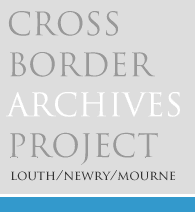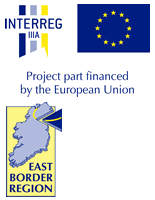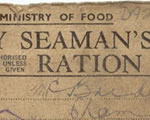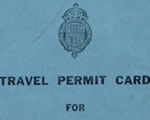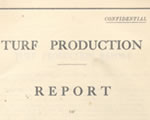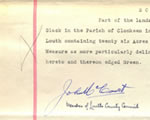World War II
Rationing and Smuggling
The Nazi control of transport routes resulted in shortages of foodstuffs, clothing and petrol. In response, rationing was introduced in Britain in November 1939 and to Northern Ireland in January 1940. In Eire, Sean Lemass was appointed as Minister for Supplies in 1939. The system of rationing aimed to ensure that everyone got a fair share of scarce resources. Set amounts of goods were allocated to each person on a weekly basis through the use of coupons in a ration book. Rationing became the norm, with each person receiving 2oz of tea and 2lb of sugar per week. Other foodstuffs such as bacon, eggs and potatoes remained available.
The production of foodstuffs on available land was encouraged and farmers were urged to grow crops which had previously been imported. The farmers were encouraged to take part in wheat schemes and seeds & fertilisers supply guarantee schemes to encourage increased tillage. In the south, wheat production grew from 250,000 tonnes in 1939 to 660,000 in 1945.
There was also a limit on the amount of clothing produced for sale. People had to 'make do and mend'. Men wore 'austerity suits' and women's skirts and dresses were made shorter to save cloth, while stockings became a rarity.
Fuel was also rationed, with the result that electricity was only available for a few hours per day. To counter this, turf production and tree felling were encouraged. Ricks of turf were stockpiled in the Fair Green in Dundalk. Emergency supplies of turf were also stored in the military barracks, Dundalk until 1946. The War highlighted Eire's continued economic dependence on Britain as her merchant ships had to receive allocations of coal at British ports. Lemass believed self-sufficiency was key to Ireland's shortages. As shortages of coal, oil and petrol worsened, alternative sources of fuel had to be found. Trains were run on turf, timber and straw. As gas was rationed, the Great Northern Railway tried to make gas in its laboratory. Private cars were rarely used, replaced by bicycles or pony and traps.
Cross-border smuggling was also rife, as shops in the villages on the southern side of the border were relatively well stocked, particularly in the early years of the War. Many Northern Ireland locals crossed the border to Omeath, bringing back cheese, bacon, jam, chocolate, cigarettes and lighters. Due to the lack of cigarette imports tobacco was grown in Cooley.
Next page - Local Defences » « Previous page - War and Neutrality
- home |
- about project |
- online catalogue |
- online exhibitions |
- activities |
- oral history collection
- about us |
- contact us |
- legal |
- acknowledgements
© Cross Border Archives Project . Website design and development by morsolutions.
This project is part financed by the European Union through the Interreg IIIA Programme managed for the Special EU Programmes Body by the East Border Region Interreg IIIA Partnership.
